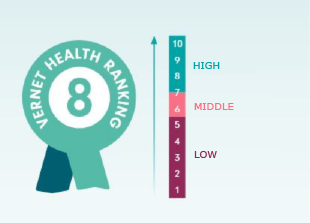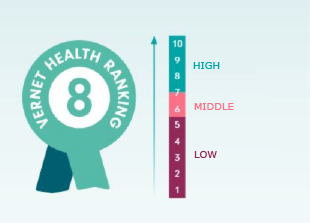Services for the health and welfare sector
Together with PFZW and social partners, we develop new products and services that contribute to a strong and sustainable health and welfare sector. Increasingly, we are combining the strengths of PGGM&CO, PFZW’s member organisation, Vernet, the market leader in HR and absence data in healthcare, and PFZW Data Services, which uses data to help tackle workforce challenges in the health and welfare sector. This collaboration is reflected, among other things, in ‘het Preventieplan’.


Working together to reduce absenteeism in healthcare
Inspiration and insights at the Vernet Health Ranking Event
Karlein Bijlsma, Acting Director of Operations at Vernet
On 27 March 2024, more than seventy healthcare professionals gathered for the Vernet Health Ranking Event: an inspiring afternoon full of insights into effective absence management. By sharing good practices, Vernet aims to encourage other healthcare organisations to innovate. After all, if we want to reduce workload and staff shortages in healthcare, absenteeism needs to come down.
Learning from the best examples
The event, organised by Vernet since 2011, is not just about the numbers. The focus is on the stories behind the data. What approaches have proven effective? And what can organisations learn from one another? During the event, the Vernet Health Ranking Awards were presented to the top three healthcare organisations in each sector. The ranking is based on factors such as overall absenteeism, its development over time and the composition of the workforce. The result is a diverse overview of organisations that each excel in managing absenteeism in their own way.
What helps reduce absenteeism?
The best-performing organisations share several success factors. They place a strong focus on prevention: conversations with employees take place early on, before any problems occur. Leadership and workplace culture also play a significant role. Engaged managers and a safe, positive working culture contribute to greater job satisfaction and lower absence rates. There is also a clear emphasis on what employees can do. By allowing time to recover and offering tailored solutions, employees feel supported and taken seriously.
By learning from one another, healthcare organisations can work together to create a future in which job satisfaction is key and absenteeism is consistently reduced.


Engaged managers and a safe, positive working culture contribute to greater job satisfaction and lower absence rates.
Where the sector stands today
How is the healthcare sector faring in terms of absenteeism? According to Karlein Bijlsma, acting Director of Operations at Vernet, the overall absenteeism rate has remained almost unchanged compared with 2023. Of growing concern, however, is the rise in long-term absence, defined as more than 92 days. In addition, the first months of this year saw a clear spike in short-term absence, primarily due to the flu wave in January and February.
The power of connection
The strength of the event lies in sharing experiences, both within and across sectors. That is why, alongside this year’s winners, previous winners were also invited to the stage. We also offered inspiration on a relevant topic: generational differences and mental resilience in an increasingly digital society.
By working together, employers in the sector can make real progress. This sense of connection matters not only between organisations, but also within teams. Especially in settings where colleagues do not see each other regularly, such as in home care, it is important to make conversations about wellbeing and job satisfaction a natural part of daily work. Not just in meetings, but informally too. By learning from one another, healthcare organisations can work together to build a future where job satisfaction takes centre stage and absenteeism is consistently reduced.

About Vernet
Since 1996, Vernet has been the leading research agency and knowledge network for HR and absenteeism data in the healthcare sector. As the market leader, Vernet collects, compares and interprets absenteeism figures with one clear goal: helping healthcare organisations keep their staff sustainably employable.
Around 400 healthcare organisations, representing approximately 600,000 employees, use Vernet’s services. By offering insight into current data, Vernet offers practical tools to healthcare institutions and sector bodies to better understand absenteeism and actively reduce it.
Vernet operates as a fully owned subsidiary of PGGM, which specialises in pension administration.
Research among PGGM&CO members
PGGM&CO is a member organisation with over 500,000 members, including 365,000 active members who work or have worked in the health and welfare sector. PGGM&CO supports everyone in the sector in staying physically, mentally and financially fit.
Acting as a guide, PGGM&CO provides insights and perspective based on research to help members make informed choices that support their wellbeing through information, experiences, services, products and exclusive benefits. Together with social partners where possible, PGGM&CO also helps employers support their staff, enabling employees to continue working with balance and enjoyment in a healthy health and welfare sector.
PFZW Datadiensten: Smart solutions for a growing demand in healthcare
Michelle Boer and Vincent Croes - Marketing and Communications Advisors, PFZW Datadiensten


The health sector is under pressure. Demand for care continues to grow, while it is becoming increasingly difficult to find enough staff. We cannot bridge that gap with people alone. If we tried, one in four would soon need to work in healthcare, which simply is not sustainable. To meet this challenge, we must work together to find smart solutions. At PFZW Datadiensten, we contribute by giving organisations insight into their own data, helping them prepare for the future.
All data received by our client PFZW is made available again via the HR Data Portal, an online platform organisations can access free of charge. Employers can gain insight into their own data and see how they compare with similar organisations. This gives them a clear picture of both the challenges and opportunities they face.
This is not something we do alone; we work closely with other organisations in the sector and the Ministry of Health, Welfare and Sport (VWS). The ministry has even purchased access to part of our HR Data Portal so that every employer in the sector can benchmark for free. Together with PGGM&CO and Vernet, a PGGM subsidiary, we are also setting up a new partnership to strengthen each other’s efforts in supporting the healthcare and welfare sector.
Which other products and services do we offer?
Discover which specific products and services we use to genuinely support organisations in the health and welfare sector.
Read more
By learning from one another, healthcare organisations can work together to build a future where job satisfaction comes first and absenteeism is consistently reduced.
Pressure on the healthcare sector is mounting. Staff shortages, an ageing population and increasing demand for healthcare are creating major challenges. What steps can you take today to be prepared for tomorrow? The SPP Tool is one of the solutions we offer to help organisations plan ahead. Developed by PFZW, this tool supports individual organisations in their strategic workforce planning. It provides insight into the expected future workforce and staffing needs, down to job level. Employers can run different scenarios based on variables they set themselves, making it easier to assess the potential impact of policy choices or planned interventions.
Want to know more?
Services for the health and welfare sector in numbers
* = 500,000 members, of which 365,000 were active members in 2024; inactive members are excluded, and all non-active members are not included in the membership
Number of employees in the health and welfare sector
1.419.000
1.390.000
2024
2023
Number of PGGM&CO members*
2024
2023
500.000
765.000
Number of PFZW Datadiensten subscriptions
2024
2023
1.814
1.321
Number of connected institutions to Vernet
2024
2023
350
339



Together with PFZW and social partners, we develop new products and services that contribute to a strong and sustainable health and welfare sector. Increasingly, we are combining the strengths of PGGM&CO, PFZW’s member organisation, Vernet, the market leader in HR and absence data in healthcare, and PFZW Data Services, which uses data to help tackle workforce challenges in the health and welfare sector. This collaboration is reflected, among other things, in ‘het Preventieplan’.
Services for the health and welfare sector

Working together to reduce absenteeism in healthcare
Inspiration and insights at the Vernet Health Ranking Event
Karlein Bijlsma, Acting Director of Operations at Vernet
On 27 March 2024, more than seventy healthcare professionals gathered for the Vernet Health Ranking Event: an inspiring afternoon full of insights into effective absence management. By sharing good practices, Vernet aims to encourage other healthcare organisations to innovate. After all, if we want to reduce workload and staff shortages in healthcare, absenteeism needs to come down.
Learning from the best examples
The event, organised by Vernet since 2011, is not just about the numbers. The focus is on the stories behind the data. What approaches have proven effective? And what can organisations learn from one another? During the event, the Vernet Health Ranking Awards were presented to the top three healthcare organisations in each sector. The ranking is based on factors such as overall absenteeism, its development over time and the composition of the workforce. The result is a diverse overview of organisations that each excel in managing absenteeism in their own way.
What helps reduce absenteeism?
The best-performing organisations share several success factors. They place a strong focus on prevention: conversations with employees take place early on, before any problems occur. Leadership and workplace culture also play a significant role. Engaged managers and a safe, positive working culture contribute to greater job satisfaction and lower absence rates. There is also a clear emphasis on what employees can do. By allowing time to recover and offering tailored solutions, employees feel supported and taken seriously.
By learning from one another, healthcare organisations can work together to create a future in which job satisfaction is key and absenteeism is consistently reduced.

Engaged managers and a safe, positive working culture contribute to greater job satisfaction and lower absence rates.
Where the sector stands today
How is the healthcare sector faring in terms of absenteeism? According to Karlein Bijlsma, acting Director of Operations at Vernet, the overall absenteeism rate has remained almost unchanged compared with 2023. Of growing concern, however, is the rise in long-term absence, defined as more than 92 days. In addition, the first months of this year saw a clear spike in short-term absence, primarily due to the flu wave in January and February.
The power of connection
The strength of the event lies in sharing experiences, both within and across sectors. That is why, alongside this year’s winners, previous winners were also invited to the stage. We also offered inspiration on a relevant topic: generational differences and mental resilience in an increasingly digital society.
By working together, employers in the sector can make real progress. This sense of connection matters not only between organisations, but also within teams. Especially in settings where colleagues do not see each other regularly, such as in home care, it is important to make conversations about wellbeing and job satisfaction a natural part of daily work. Not just in meetings, but informally too. By learning from one another, healthcare organisations can work together to build a future where job satisfaction takes centre stage and absenteeism is consistently reduced.
About Vernet
Since 1996, Vernet has been the leading research agency and knowledge network for HR and absenteeism data in the healthcare sector. As the market leader, Vernet collects, compares and interprets absenteeism figures with one clear goal: helping healthcare organisations keep their staff sustainably employable.
Around 400 healthcare organisations, representing approximately 600,000 employees, use Vernet’s services. By offering insight into current data, Vernet offers practical tools to healthcare institutions and sector bodies to better understand absenteeism and actively reduce it.
Vernet operates as a fully owned subsidiary of PGGM, which specialises in pension administration.
Research among PGGM&CO members
PGGM&CO is a member organisation with over 500,000 members, including 365,000 active members who work or have worked in the health and welfare sector. PGGM&CO supports everyone in the sector in staying physically, mentally and financially fit.
Acting as a guide, PGGM&CO provides insights and perspective based on research to help members make informed choices that support their wellbeing through information, experiences, services, products and exclusive benefits. Together with social partners where possible, PGGM&CO also helps employers support their staff, enabling employees to continue working with balance and enjoyment in a healthy health and welfare sector.
PFZW Datadiensten: Smart solutions for a growing demand in healthcare
Michelle Boer and Vincent Croes - Marketing and Communications Advisors, PFZW Datadiensten


The health sector is under pressure. Demand for care continues to grow, while it is becoming increasingly difficult to find enough staff. We cannot bridge that gap with people alone. If we tried, one in four would soon need to work in healthcare, which simply is not sustainable. To meet this challenge, we must work together to find smart solutions. At PFZW Datadiensten, we contribute by giving organisations insight into their own data, helping them prepare for the future.
All data received by our client PFZW is made available again via the HR Data Portal, an online platform organisations can access free of charge. Employers can gain insight into their own data and see how they compare with similar organisations. This gives them a clear picture of both the challenges and opportunities they face.
This is not something we do alone; we work closely with other organisations in the sector and the Ministry of Health, Welfare and Sport (VWS). The ministry has even purchased access to part of our HR Data Portal so that every employer in the sector can benchmark for free. Together with PGGM&CO and Vernet, a PGGM subsidiary, we are also setting up a new partnership to strengthen each other’s efforts in supporting the healthcare and welfare sector.
Discover which specific products and services we use to genuinely support organisations in the health and welfare sector.
Which other products and services do we offer?
Read more
By learning from one another, healthcare organisations can work together to build a future where job satisfaction comes first and absenteeism is consistently reduced.
Pressure on the healthcare sector is mounting. Staff shortages, an ageing population and increasing demand for healthcare are creating major challenges. What steps can you take today to be prepared for tomorrow? The SPP Tool is one of the solutions we offer to help organisations plan ahead. Developed by PFZW, this tool supports individual organisations in their strategic workforce planning. It provides insight into the expected future workforce and staffing needs, down to job level. Employers can run different scenarios based on variables they set themselves, making it easier to assess the potential impact of policy choices or planned interventions.
Want to know more?
Services for the health and welfare sector in numbers
* = 500,000 members, of which 365,000 were active members in 2024; inactive members are excluded, and all non-active members are not included in the membership
Number of employees in the health and welfare sector
1.419.000
1.390.000
2024
2023
Number of PGGM&CO members*
2024
2023
500.000
765.000
Number of PFZW Datadiensten subscriptions
2024
2023
1.814
1.321
Number of connected institutions to Vernet
2024
2023
350
339